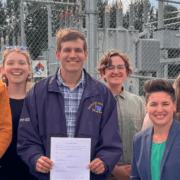Alaska’s Clean Energy Future: What’s at Stake Under Trump
During the Biden Administration we saw a wave of unprecedented funding for our nation’s infrastructure. Both the Bipartisan Infrastructure Law (BIL) and Inflation Reduction Act (IRA), two pieces of legislation aimed at investing in American infrastructure, included substantial investments for green technology and clean energy projects. While many states have already begun to benefit from these federal dollars, we now risk a rollback that could reverse progress on our energy independence in Alaska.
Before entering office, President Trump and his transition team promised voters that his administration would make sweeping cuts to our national budget starting on Day One of his presidency.
On his first day in office, President Trump signed an executive order on American energy. The executive order directs all government agencies to pause the “disbursement of funds” appropriated through the BIL and IRA. It goes on to direct the Office of Management and Budget (OMB) to review plans for future spending against provisions laid out in the order. These actions put unspent funds at risk of reallocation or new restrictions.
A good portion of BIL and IRA funding has already been obligated, and therefore is more likely to be distributed as planned. This has done little to ease fears for funding recipients still in the early stages of project implementation, however, who worry that unspent dollars could end up being the subject of future litigation – leading to project delays and added expenses.
Monday’s executive order is likely just the beginning of directives aimed at federal infrastructure funding. The President has made it clear that Congress should not have the final word on federal spending. A president withholding appropriated funds (known as impoundment) is illegal, but Trump has promised to challenge the limits of this process in order to exercise complete control over the national budget.
President Trump has not been hesitant to test the limits of impoundment in the past. During his previous term in office, the Government Accountability Office determined that President Trump illegally withheld 91 million dollars appropriated for the development of cutting edge energy technologies under the Department of Energy (DOE).
Programs funded through the BIL and IRA have been very popular in blue and red states alike, particularly as Americans contend with rising energy costs and utilities struggle to meet increasing consumer demand. It’s unclear how precisely this upcoming budget battle will play out. What is clear is that President Trump is putting millions of dollars of investments in Alaska at risk.
In Alaska, planning is already underway for the rollout of Solar for All funding directed to benefit both household and community solar installations across the state funded by IRA legislation. The DOE and Environmental Protection Agency have also awarded funds to Alaska that would increase communities’ energy resilience during extreme weather, and boost the energy sovereignty of Alaska Native communities. Together, these programs would grow economic opportunities within the state and decrease greenhouse gas emissions.
As Alaskans are well aware, our building season is short, and even minor delays can have huge repercussions for project success. While the fate of new infrastructure projects born from the IRA and BIL remain uncertain, The Alaska Center is committed to ensuring federal funds for green energy stay in Alaska over the next four years. Join us in advocating to protect these funds while we also seek new clean energy investments from our state and local leaders.
With determination for Alaska’s future,
The Alaska Center










